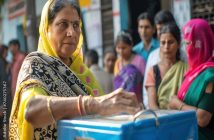Shri L.K. Advani, prime ministerial candidate of the BJP and NDA, today took time out of his busy schedule of election campaigning, to hold a roundtable with experts in healthcare. He pledged to implement the promise of ‘HEALTH FOR ALL’, contained in the BJP’s election manifesto, in the event of the NDA winning the people’s mandate in the coming Lok Sabha elections.
In his opening remarks, Shri Advani said, “My belief in healthcare as an important element of Good Governance and Development was greatly reinforced by a thought expressed by Nobel laureate Dr. Amartya Sen. In one of his books, Dr. Sen writes that the neglect of education and healthcare is the principal reason for India’s backwardness. I know that Health for All is one of the toughest challenges, given the fact that the current condition of healthcare in our country is abysmal. But we are determined to accept and overcome this challenge.”
The meeting was attended by Shri Jaswant Singh, former Union Finance, Defence and External Affairs Minister; two former Union Health Ministers Dr. C.P. Thakur and Shri Shatrughan Sinha; Shri Vijay Kapoor, who conducted the meeting; Dr. Harsh Vardhan, Former Health Minister of Delhi and Sudheendra Kulkarni, a member of the BJP’s election strategy group.
Participants in the roundtable (list of their names attached) gave many useful suggestions on different aspects of the strategy needed to move towards the goal of ‘HEALTH FOR ALL’. All of them emphasized the need to re-orient healthcare in India towards preventive and wellness care. They urged the BJP leadership to vastly increase government spending on healthcare (which is now less than 1% of GDP) and, at the same time, shift the focus from inputs to outcomes. Many useful ideas were presented on radically improving healthcare in rural areas.
Shri Advani referred to his earlier roundtable with experts in drinking water, in which they had urged the BJP to make access to clean drinking water a fundamental right for all citizens. “We have made this promise in the BJP manifesto,” he said, adding, “Based on today’s consultation, I wish to say that the NDA will also make affordable health care for all citizens a fundamental right.”
Shri Advani also expressed his support to the following suggestions:
-
Universal Health Insurance Scheme, launched by the NDA Government, will be revived, with the Central Government bearing the expense of medical insurance for all BPL families.
-
Total Sanitation Campaign, waste disposal and recycling, nutritional security to children, and eradication of communicable diseases will receive highest attention from the Government.
-
50 essential medicines, which can take care of 90% of common diseases, will be distributed free to all needy citizens.
-
Each tehsil will have a well-equipped hospital with a bed strength of at least 50.
-
Each district will have a modern multi-speciality hospital with an attached medical college. Public-Private Partnership model will be adopted for this purpose. This district will have a mobile extension service to cater to the needs of nearby rural areas.
-
Existing healthcare infrastructure, in which considerable public investment has already taken place, has enormous scope for improvement with minimal additional investment. Policy will be reformed to enable the private sector to partner in running this system.
-
Ayurveda will be given primacy in the overall healthcare plan. Over 7,00,000 practitioners of Ayurveda and other Indian systems of medicine have been making a major contribution to healthcare in rural and remote areas. They will be assisted to further expand and improve their services.
-
The entire healthcare system will be made more woman-centric and child-centric.
-
Considering the growing healthcare needs of senior citizens, the government will provide interest-free loans to young couples to build an extra room in their homes for their parents.
-
Every ministry in Government of India will incorporate healthcare as part of its plans and programmes.
-
Corruption in healthcare administration and medical education will be removed. Medical education will be made affordable.
-
In order to meet the enormous need for trained healthcare workforce in rural areas, the Government will start a new medical education course to create a large public healthcare cadre, who will work in rural areas.
-
Information Technology will be used innovatively and extensively to connect every hospital and every PHC in rural areas to the National Telemedicine Service Network.
-
Health tourism will be promoted in a big way.



